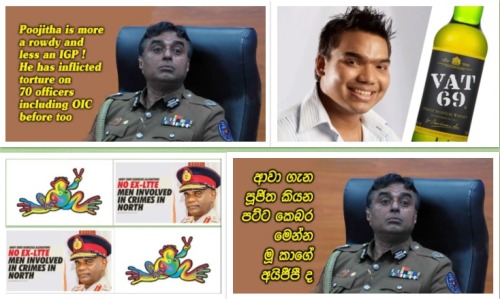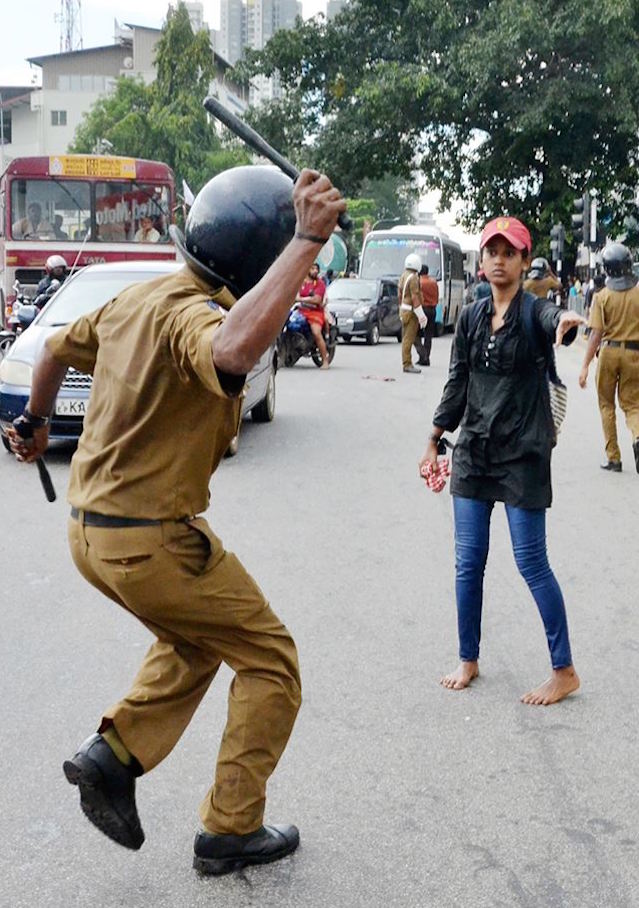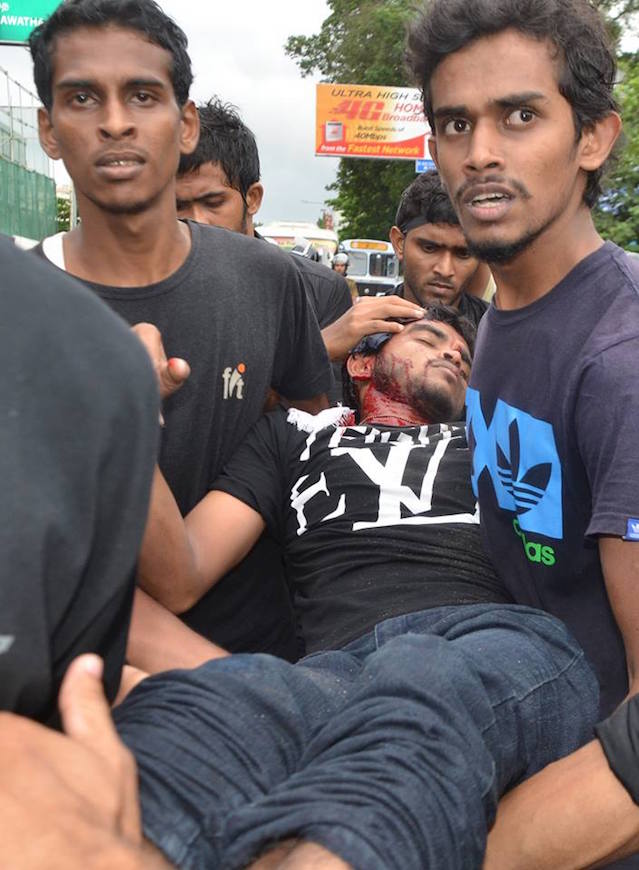Manhandling a lift operator Is the IGP above the Law?
 BY Cassendra Doole-2017-08-20
BY Cassendra Doole-2017-08-20Inspector General of Police Pujith Jayasundara is again at the centre of a controversy after a CCTV video recording showing him manhandling a lift operator went viral last week. The video first appeared on a notorious online gossip news site and was later shared by a number of media organizations in the country. Several international wire services also picked up the story.
Although the video was leaked only last week, the incident had been recorded in early April on a CCTV camera fixed inside a lift at the Police Headquarters. The video shows the IGP walking into a lift, pushing a person inside and then grabbing him by the collar, apparently making threatening gestures.
When the incident started gathering steam on social media and the public started raising their concerns, the Police gave an official explanation. According to Police Spokesman SP Ruwan Gunasekara the incident was triggered by a minor employee who had failed to follow the rules and regulations of the Police Department. As any other State institution, the Police Department too follows the morning practice of observing religious rituals and meditation programmes, after singing the National Anthem.
The objective is to create 'mental tranquillity and discipline' among the officers and other employees. At the Police Department, the morning meditation programme is strictly enforced as it is something close to the IGP's heart. However, the lift operator was caught by the IGP himself for failing to take part in the meditation ritual. The IGP has apparently given him a warning. It was this incident that had been captured by the CCTV camera, the Police said.
SP Gunasekara was also quick to dismiss the rumours that later surfaced about this video and the circumstances that had led to its recording. One such rumour said the IGP was in fact warning this particular employee over a complaint of alleged sexual harassment by a female receptionist. Yet, the Police Spokesman dismissed this rumour as a baseless claim.
Meanwhile, SP Gunasekara said, during a recent Cabinet media briefing, an investigation has been launched to probe the incident and the necessary future course of action would be initiated on the matter under the civil law.
He added the IGP is mulling legal action against the gossip website for leaking the video and the defamatory remarks made against him.
However, for the general public this was not just a matter of a leaked video, this is a matter about the conduct of the top most officer in charge of country's law enforcement. The public outcry was to conduct an immediate inquiry into the behaviour of the IGP. What with the passage of the 19th Amendment to the Constitution and the institution of independent commissions one would assume that there is transparency in governance and officials in top positions can be held responsible for their actions. But, unfortunately, that is not to be.
The mission of the National Police Commission is: "To transform Sri Lanka Police into an efficient, transparent and responsive service that, respects and protects Human Rights, ensures Public Accountability and upholds the Rule of Law." However, when contacted, the response of the National Police Commission regarding the incident was they had no authority to take action against or inquire into the actions of the Inspector General of Police.
Secretary of the National Police Commission, Ariyadasa Cooray, categorically told Ceylon Today the Commission will not be inquiring into this matter. According to Secretary Cooray, the Commission has jurisdiction over all ranks of the Sri Lanka Police with the exception of the IGP. Thus, the Commission has the power to inquire into actions of all Police officers, report on their discipline and make decisions that would decide their career at the force; all except the IGP.
This exception, according to Cooray, comes from a technicality; the position of the Inspector General of Police is filled in a procedure where the Constitutional Council makes recommendations of applicable candidates and is chosen by the President. Similar to the appointment of the Chief Justice, Supreme Court justices, Attorney General, Auditor General and several other positions, it is the Constitutional Council that decides the ultimate fate of the IGP.
Incidentally, it is the Constitutional Council that has the authority to maintain the independent commissions and monitoring their affairs. This includes the Independent Police Commission. However, in a strange state of affairs, even the Constitutional Council seems as if it doesn't want anything to do with the IGP. Dr. A.T. Ariyaratne, a member of the Constitutional Council told the media that the Council has no authority to intervene in this matter as it only acts as a recommendation body.
He was of the opinion that even though the Council recommends the best person for the IGP position, that responsibility ends then and there. Accordingly, the only body that actually has the capability of inquiring into the case is the National Police Commission.
It appears that the two authorities set up specifically to maintain transparency and good governance in the public service are now trying to wipe their hands off the matter. It makes the people wonder whether this incident too would be brushed under the proverbial carpet, like many other similar cases against top officials in the government, by blaming it on technicalities.
However, the damage this incident has caused to the image of the country is far worse than any authority wants to admit. In the words of Cabinet Spokesman Minister Rajitha Senaratne, "If our Police Chief is behaving like this, then we will have to accept when international organizations accuse our police of routinely using torture on suspects."

.jpg)




